Joe Biden asserted that ‘the days of the United States rolling over in the face of Russia’s aggressive actions are over’. The first months of his tenure in office have given substance to such claims and confirmed that the new administration aims at containing and counteracting Russian malign behavior and to impose costs so as to affect the Kremlin’s risk calculus. Hannes Adomeit poses the question as to whether Germany can and most likely will be a viable partner in such a U.S. strategy.
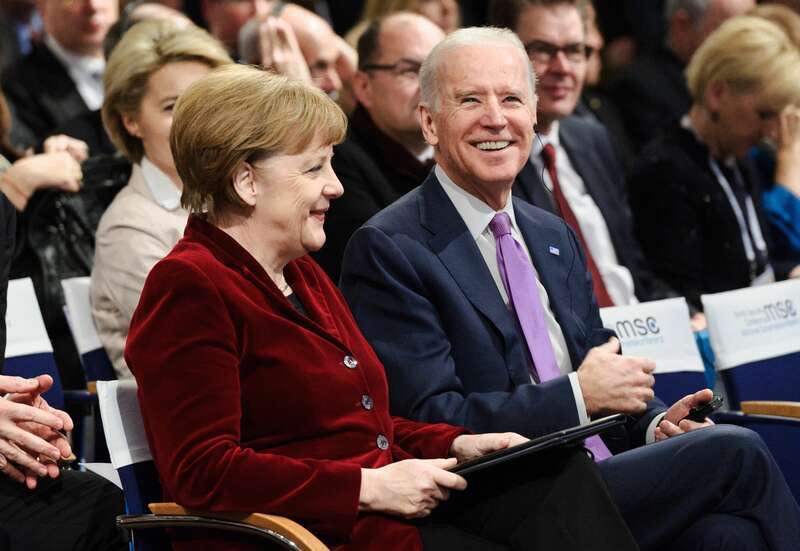 Angela Merkel and Joe Biden at the Munich Security Conference in 2015. Photo MSC
Angela Merkel and Joe Biden at the Munich Security Conference in 2015. Photo MSC
On the face of it, German government perceptions of Putin’s Russia appear to be congruent with those of the Biden administration. For instance, on 13 May 2020, chancellor Angela Merkel of the Christian Democrats (CDU) stated in the Bundestag that ‘Russia has [developed] a strategy of hybrid warfare. We must not push this aside. This is warfare in the form of cyber disorientation and disinformation. This is a strategy, not some random outcome.’
Similarly, Heiko Maas of the Social Democrats (SPD), shortly after he had taken office as foreign minister, shared this diagnosis. He deplored Russia’s ‘increasingly hostile behavior’ and that ‘for the first time since the end of the Second World War, chemical weapons forbidden [under international law] have been used in the middle of Europe’. Cyber attacks seemed to have become an integral ‘part of Russian foreign policy’. In Ukraine, Russia had committed ‘aggression’. Concerning Syria, Russia had ‘blocked the UN Security Council’; its Syrian-based air force had committed ‘war crimes’.
Michael Roth (SPD), secretary of state in the foreign ministry, has supported this assessment of his superior. In a much noted comprehensive analysis published in January 2021, he argued that Russia was massively upgrading its conventional and nuclear weapons; using military force in its neighborhood; and backing up its foreign policy by military and political threats. In sum, Russia defined itself as a ‘countervailing power to the West’ and had created a situation that ‘poses very specific threats to Germany’.
Such views can be found by prominent deputies in parliament. Thus, on 24 April Norbert Röttgen (CDU), chairman of the Bundestag’s foreign affairs committee, charged that Putin had ‘ordered the largest troop deployment since the annexation of Crimea in 2014’ and that, therefore, to call on both sides to de-escalate, was ‘sending the wrong signals to Russia. We have to make it clear to Putin that he has to pay a price for every aggressive step’. If Europe accepted Russia's aggression and the use of violence as part of its foreign policy, ‘then Europe is once again a divided continent where violence reigns [in one of its parts]’.
Whereas such assessments have increasingly come to reflect the actual state of affairs and converged with the current US administration’s stance, they have failed to be translated into significant changes of policy towards Russia. In fact, there is a wide gap between perception and policies − between the acknowledgement of the Kremlin’s repressive domestic policies and aggressive foreign policy, on the one hand, and correspondingly ‘tough’ responses, on the other.
Summary
The perceptions by the German government of Putin’s Russia appear to converge with the views of the Biden administration. Both acknowledge the link between the Kremlin’s repressive domestic policies and aggressive foreign policy. But in German government, there is a wide gap between the views and correspondingly tough responses. After the poisoning of opposition leader Alexei Navalny, a turning point appeared to have been reached. Scrapping or imposing a moratorium on the Nord Stream 2 project seemed to be on the sanctions table. But the idea was quickly abandoned. This is due to domestic politics, and the September parliamentary elections are unlikely to change this state of affairs:
- Current popularity ratings and voting preferences show a significant downturn in the fortunes of the governmental coalition parties, the CDU/CSU but particularly of the SPD. If elections had been held on 16 May, according to polls, the conservatives, with Armin Laschet as candidate for the chancellorship, would have received 24 percent of the vote, but the socialists a mere 15 percent.
- The poor result for the SPD will make it highly unlikely that the party will again be part of a coalition government led by the conservatives.
- The most significant and only last year completely unexpected development has been the meteoric rise of the Greens with Annalena Baerbock as the party’s candidate for the chancellorship. An astounding 25 percent would have voted for the party in mid-May.
- This does not mean that the electoral arithmetic will remain unchanged and that the Greens will form the government but the party will undoubtedly have an important role in any coalition, which could be one formed with the CDU/CSU.
- The attitudes of the Greens on Russia have consistently been critical. They even have supported scrapping Nord Stream 2. They are, however, unlikely to respond to calls for burden sharing, let along risk sharing in the relationship with Russia.
- Evidence of this can be found in the fact that they oppose meeting the NATO target of spending 2 percent of GDP on defence, delivering ‘lethal’ weapons to Ukraine or embark on a comprehensive modernisation programme for the German armed forces.
- It is hard in the German party political spectrum, minus individual exceptions, to find adherents of a ‘pushback’ strategy against Putin’s Russia. The resistance to such an approach is particularly strong in the left-wing Die Linke and the right-wing populist Alternative für Deutschland (AfD).
- There is a strong current in all the parties and in public opinion that the repressive trends in Russian domestic politics notwithstanding, intensifying ‘dialogue’ and finding’ compromises’ with Russia will serve German interests better than joining the US in a ‘confrontationist’ endeavour.
- Specifically concerning Ukraine, there is broad agreement in German government, the main political parties and also public opinion that the sovereignty and territorial integrity of Ukraine remains a vital concern for Europe but this will not translate into coordinated action in conjunction with the US for the deterrence of Russian aggression.For a brief time, that gap appeared to have been closed by the poisoning of blogger and opposition leader Alexei Navalny on 20 August 20. Thus, in an interview on 6 September 2020, foreign minister Maas said that if Russia were not to cooperate with the investigation in the poisoning, sanctions might well be necessary, but he hoped that ‘the Russians won’t force us to change our stance on Nord Stream 2’.
Similarly, chancellor Merkel who with one single exception in April 2018 had called Nord Stream 2 a purely ‘commercial project’ and insisted on separating the poisoning of Navalny and Nord Stream 2, also appeared to have moved away from her previous position: On September 7, when Merkel’s spokesman was asked whether she had changed her mind and whether she agreed with Maas to the effect that sanctions could include scrapping the project, he unambiguously replied: ‘Yes, the Chancellor also sees it that way.’
Analysts world-wide rushed to the conclusion, that the poisoning of Navalny had become – as Dmitri Trenin of the Carnegie Moscow Center wrote − ‘a turning point in Russo-German relations’ and that the Navalny poisoning had ‘prompted Berlin to make a crucial decision for German foreign policy: It will no longer follow a special policy toward Russia. Berlin will [no longer] try to understand the other side’s motivation or strive for mutual understanding and basic cooperation.’
Nothing, however, came of the idea of including Nord Stream 2 in a package of sanctions. The issue was, in essence, transferred to the European Parliament and the European Council. This raises the question as to why there is such a strong aversion in Germany to adopt a tough line vis-à-vis Russia. Domestic politics provides the answer.
Splits in parties and pacifist currents
There are many factors accounting for this. These include serious internal splits between and within the governmental coalition parties of CDU/CSU and SPD; decidedly apologetic and Putin-friendly attitudes of the prime ministers of the Länder in the eastern part of Germany, no matter what their party affiliation; the determined refusal of the opposition parties right-wing populist Alternative für Deutschland (AfD) and left-wing Die Linke in parliament; business interests as represented in particular by the influential Ost-Ausschuss der deutschen Wirtschaft (Committee on Eastern European Economic Relations); and, strong pacifist, Russia-friendly currents in German public opinion.
The aversion to adopt a ‘hard’ line towards Russia starts from the top down in the governmental institutions. In what observers have considered to be a departure from the conventional practice that the head of state not to step into the ring of political controversies, president Frank-Walter Steinmeier, in an apparent departure from the standard government position about Nord Stream 2 being a purely ‘commercial’ project, pointed not only to the political importance of the project but of energy relations in general.
‘After the enduring deterioration in relations in recent years, energy relations are almost the last bridge between Russia and Europe’, he stated in an interview on 6 February 2021. ‘Both sides have to think about whether this bridge should be demolished completely and without a replacement. Breaking bridges, in my view, is not a sign of strength. How are we supposed to influence a situation that we perceive as unacceptable when we cut the last connections?’
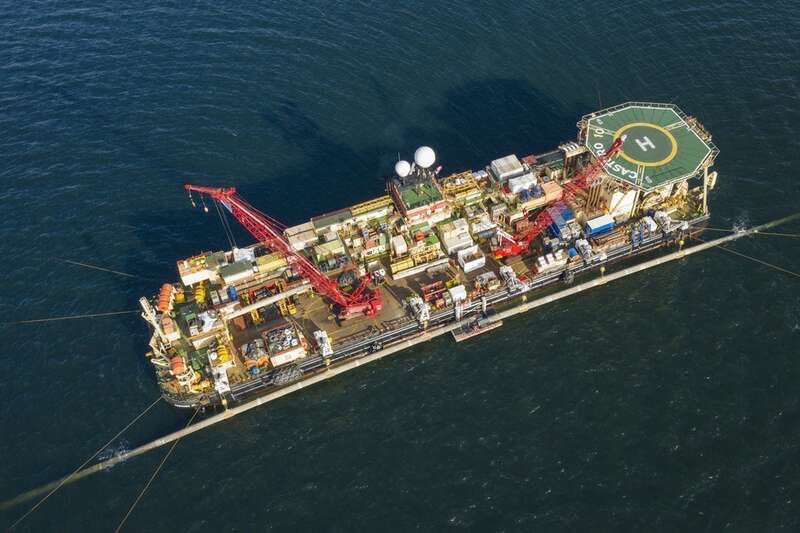 The gaspipeline from Russia to Germany in progress. Photo Nord Stream 2.com
The gaspipeline from Russia to Germany in progress. Photo Nord Stream 2.com
Steinmeier’s reasoning is fully in conformity with the positions the SPD has taken on Russia. Although the chancellor constitutionally is empowered to determine the basic orientation (Richtlinien) of policy, the foreign minister evidently must also look over his shoulder to ascertain and, if need be, conform to party positions. This appears to have happened in Maas’ case.
Shortly after his charges that Russia was acting in an ‘increasingly hostile’ manner, the SPD leadership met to discuss foreign policy issues. It transpired that it was not at all happy with the foreign minister’s stance. The then party secretary general, Lars Klingbeil, said that German-Russian relations were (as if Maas had ever denied this) both historically and at present ‘very important’ and concluded from this that ‘We want dialogue with Russia, we are looking for dialogue with Russia, and we want the dialogue to be intensified.’
This is precisely the position Maas ultimately took as part of the justification for excluding Nord Stream 2 from Russia sanctions. By adopting new sanctions in the Navalny case and previously in the Ukraine-Russia conflict, the EU and the West had amply demonstrated to the Kremlin that they were prepared to react decisively to malign Russian behavior. He rejected therefore the incessant demands by ‘smart alecks’ (Schlauberger) to adopt ever more harsh measures and refused ‘to join in the clamor for confrontation (Konfrontationsgeschrei). We want dialogue and good neighborly relations with Russia.’
Such formulations and formulas are congruent with the attitudes of what ironically or polemically in Germany are called the Putin- and Russland-Versteher, those who claim to really ‘understand’ Putin and Russia. In the coalition government, apologetic, Putin-friendly attitudes are prevalent especially in the SPD. For example, denying any semblance of the geopolitical significance of Nord Stream 2 and reiterating the party’s position on the project, co-chairman of the party Walter-Borjans claimed in January 2021 that ‘To shoot oneself in the foot isn’t any kind of solution’; apart from that, ‘the pipeline doesn’t make us more dependent but more independent’.
‘Understanding’ for the Kremlin’s policies can also be found in the SPD’s coalition partner(s), the CDU and its Bavarian wing, the CSU. In this context, the views of CDU chairman, prime minister of North-Rhine Westphalia and the party’s candidate for the chancellorship Armin Laschet are of particular interest. He has dismissed and denigrated the outrage over the Russian annexation of Crimea in 2014 as ‘anti-Putin populism’. When Britain asked for solidarity after the poisoning of the Skripals in Salisbury in 2018, he adopted the stance of the Kremlin and the Putin-Versteher by, in essence, criticising the British reaction and asking: ‘If you [want to] force almost all NATO countries to show solidarity, shouldn’t you have reliable evidence?’
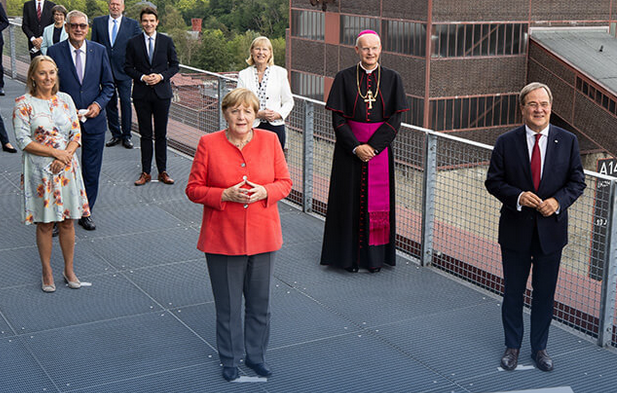 The new CDU chairman and candidate for chancellorship Armin Laschet next to Angela Merkel. Photo copyrightfree
The new CDU chairman and candidate for chancellorship Armin Laschet next to Angela Merkel. Photo copyrightfree
He has toed the line of the Kremlin and German fellow travelers on other international issues. Thus, he has suggested that the West draw closer to the Syrian despot Assad; denied that the 2018 chemical weapons attack in Eastern Ghouta was committed by the Assad regime; falsely accused the USA of supporting the IS terrorist militia against the regime in Damascus; and in general failed to take issue with the Russian military intervention, including the systematic bombing of civilian areas. It is presumably because of such Kremlin-friendly positions that ex-chancellor Gerhard Schröder (SPD), chairman of the shareholders’ committee of the Nord Stream AG and chairman of the board of directors of the Russian oil giant Rosneft, has several times spoken out in support of Laschet.
It was only after a protracted struggle with Markus Söder, the chairman of the CSU and prime minister of Bavaria, that the CDU officially nominated Laschet as the party’s candidate for the chancellorship and that Söder withdrew from the contest. This move, however, cannot be taken as evidence that the advocate of a ‘tougher’ position on Russia had lost out. In this respect, Söder’s position does not appear to have been much different from that of Laschet.
 Alexei Navalny during his recovery in Germany. Photo Instagram/Navalny
Alexei Navalny during his recovery in Germany. Photo Instagram/Navalny
The CSU chief has advised restraint in reaction to the poisoning of Navalny, saying that in the relationship with Russia one should refrain from ‘moral rigidity’. He also has rejected the idea of scrapping or freezing Nord Stream 2. For an assessment of German government policies after the September 2021 elections, it is important to note that Söder has in no way departed from the traditional apologetic and Putin-friendly attitudes of the party. That includes his predecessors in the position of head of the CSU, Edmund Stoiber, Günther Beckstein and Horst Seehofer.
Concerning other political parties represented in parliament, the AfD and Die Linke are vociferously critical of the government’s Russia policies on a solidly accommodationist basis. Whereas the AfD’s weakening of a common European stance towards the Kremlin can in part be considered to be one of the consequences of the party’s platform calling for Germany’s exit from the EU, the position of the Die Linke rules out any alignment with US policies because of the party’s traditional ‘anti-imperialist’ stance, whereby ‘imperialism’ does not pertain to Putin’s Russia but to the United States.
As for the Liberals, the FDP, it is as much divided as the parties in government. Christian Lindner, its leader, has vacillated in his views. In the 2017 parliamentary elections, he made a splash by calling for the acceptance of the status of Crimea as a ‘long-term provisional’ entity (dauerhaftes Provisiorium) that should not stand in the way of attempting improvement of relations with Russia. He also deviated from standard EU and German government positions by arguing that sanctions could at least in part be lifted prior to the complete implementation of the Minsk agreement on eastern Ukraine. In 2021, however, the added his voice to the chorus calling for a moratorium on the construction of Nord Stream 2.
The respective positions between and within the political parties and their leaderships make it an almost foregone conclusion that the September 2021 electoral campaign and any conceivable constitution of a government coalition will be exceedingly difficult and that, on relations with Russia, no ‘hard’ line is likely to emerge. This includes a coalition government that may be formed between the CDU/CSU and Bündnis 90/Die Grünen.
In fact, according to several public opinion surveys in April, the Greens for the first time in the history of the Federal Republic overtook the Conservatives in voter popularity. Following the nomination of Laschet as candidate for the chancellorship for the CDU/CSU and Annalena Baerbock for the Greens, public opinion surveys showed that the CDU/CSU lost seven percentage points, tumbling from 28 to 21 percent in voter preference. In contrast, the Greens gained five percentage points and thereby moved to first place with 28 percent. The coalition partner of the Conservatives, the SPD, also lost two percentage points and came to 13 percent. Whereas it is improbable that these figures will be replicated at the polls in September and that Baerbock will be Germany’s next chancellor, the Greens are likely to be a major constituent part of a coalition government, whatever its precise composition. This raises the question as to their foreign policy positions, notably on Russia.
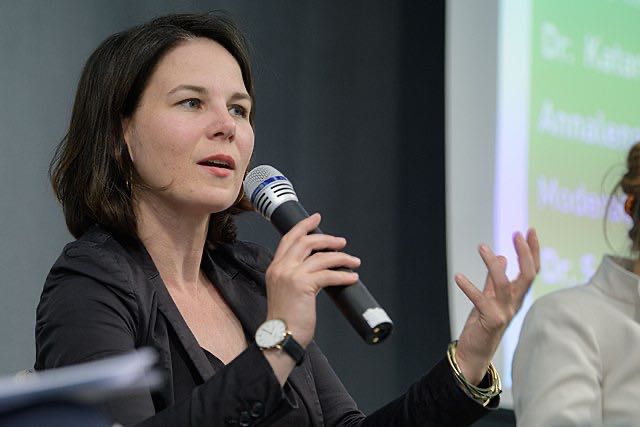 Leader of the Greens Annalena Baerbock. Photo Stephan Roehl CC
Leader of the Greens Annalena Baerbock. Photo Stephan Roehl CC
The Greens, security and defense policy wild card
In the past few years, the Greens have consistently and harshly criticized the Putin system and its domestic and foreign policies, and they have been staunch advocates of Russia sanctions. As the party programme for the parliamentary elections in September 2021 states, this includes stopping Nord Stream 2 ‘not only for considerations of climate and energy but above all, in view of the situation in Ukraine, geostrategic’. That position is in conformity with the party’s traditional value-based (wertegeleitete) approach to foreign policy, and it is linked to its assessment of Russia as a country that ‘has increasingly turned into an authoritarian state and is ever more vigorously undermining democracy and stability in the EU and in the common neighborhood’.
But the party discerns grounds for optimism. It thinks that ‘the democracy movement in Russia is growing’ and therefore adopts the following position: ‘We want to support the courageous civil society, which is standing up to the ever harsher repression by the Kremlin and fighting for human rights, democracy and the rule of law, and we want to intensify the exchange with it.’
The party programme, however, contains not a word about Russia as a security threat, nor does it provide some idea about the scope of what in US parlance is referred to as ‘malign’ international behavior. It also fails to point to the Kremlin’s military modernization efforts, its use of force in Europe and in Syria, and its recurrent threat of the use of force. This makes one wonder about what could be meant by the party’s demand for the elaboration of a ‘new strategic posture of NATO and a common threat assessment’ of the alliance.
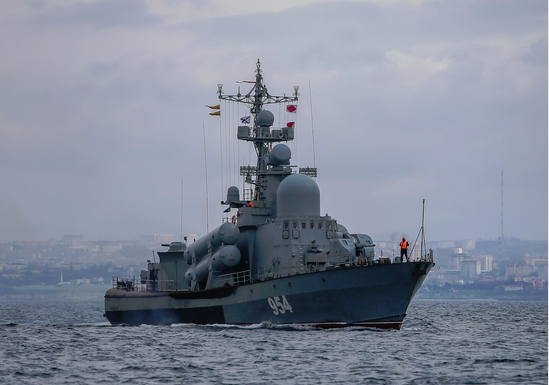 Russia's military exercises in the Black Sea in April. Photo Ministry of Defense Russia
Russia's military exercises in the Black Sea in April. Photo Ministry of Defense Russia
Germany as other European countries fails to live up to its commitment assumed at the Wales NATO summit to spend a minimum of 2% of GDP on defense until 2024. The German defense budget has increased but the 2020 figure adds up to only 1.4 percent of GDP, and the projected increases in the coming years are far from reaching the agreed-upon alliance target. The party programme of the Greens calls for a ‘fair burden sharing between NATO member states’ but it is doubtful that the Greens in government would improve on that figure considering that the party programme rejects the NATO 2 percent target as entirely ‘arbitrary’ and Baerbock has even called the 2 percent commitment to be ‘absurd’.
Furthermore, apparently in response to discussions about the possible achievement of EU ‘strategic autonomy’, the programme advocates the ‘establishment of an EU Security Union with strong parliamentary control and a common restrictive arms export policy’. No detail is provided as to how this is to be achieved and what the balance of financing might be between a ‘fair share’ for NATO and the EU’s Security Union. It is more than likely that in any conflict between budgetary allocations for environmental purposes and defense, it will be the latter that will lose out.
The party, however, does realize that ‘the use of military force may be necessary as ultima ratio in some situations’, of which it mentions two: ‘to prevent genocide and to create the possibility of a political solution to a conflict’. The emphasis is clearly on humanitarian interventionism and application of the UN’s principle of the ‘responsibility to protect’. Yet even this rationale is controversial. For instance, in November 2014 the party opposed weapons deliveries to the Kurds in support of their military operations against ISIS and the atrocities committed by the radical islamists against civilians, one argument being that the weapons could fall into the wrong hands and another that ‘arms only make wars more bloody’.
It is evident, however, that for the Greens arms exports for non-humanitarian purposes are out of the question, particularly if these were in any way related to strengthening the defense capabilities of actual or potential targets of Russian military intervention in Europe. That position is widely shared by the German government, parliament and public opinion, and it certainly has a negative bearing on the prospects of Germany participating in a ‘pushback’ against Russian malign behavior. It also spells trouble for future US-German relations.
‘There can be no military solution!’
Chancellor Merkel apparently anticipates that this will be the case. One day after Biden’s inauguration she admitted that ‘There will […] be different opinions with the Biden administration. For example, I have always been against certain forms of arms deliveries [lethal weapons] to Ukraine but the United States under Barack Obama and especially Joe Biden disagreed. This, I believe, previously played a role [in our relationship]. The foreign ministry continues to be adamantly opposed to weapons deliveries. In April 2021 it again rejected a request by Kiev for the delivery of air defense systems, anti-ship missiles and mine-sweeping equipment, as it had earlier rejected the sale of corvettes no longer in use in the German Navy.
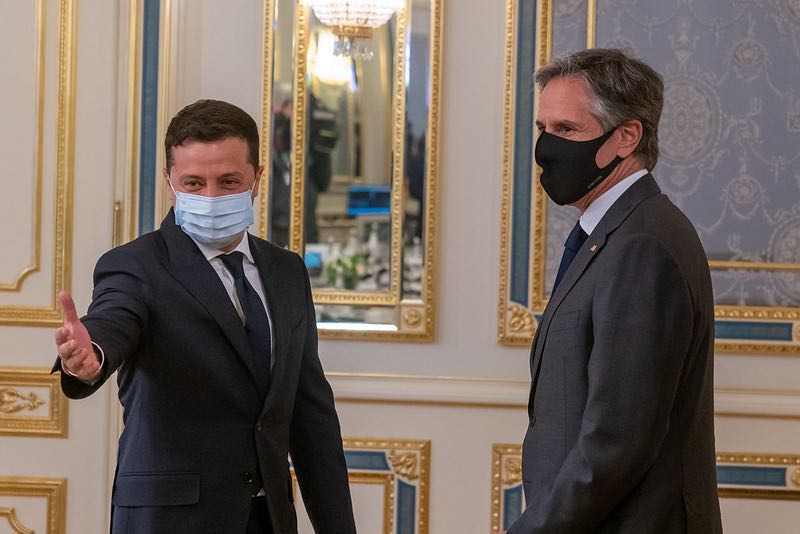 American Secretary of State Anthony Blinken with president Volodymir Zelensky during a visit to Kiev on 6 May. Photo U.S. State Department
American Secretary of State Anthony Blinken with president Volodymir Zelensky during a visit to Kiev on 6 May. Photo U.S. State Department
The refusal to strengthen the defense capabilities of Ukraine against the potential use of force by Russia conforms to the general pattern of the government to avoid ‘provocation’ and putative apparent risks of escalation and confrontation. The most memorable of such attitudes has been provided by then foreign minister Steinmeier in the context of the large-scale military exercises Anaconda carried out by Poland with other NATO partners, including Germany. ‘What we shouldn’t do now’, he said, ‘is to further aggravate the situation with loud saber rattles and howls of war (Kriegsgeheul). Anyone who believes that symbolic tank parades on the eastern border of the alliance will create more security is wrong. We are well advised not to deliver free of charge any excuses for a new, old confrontation.’
Such appeals to ‘non-provocative’ behavior towards Russia have been repeated by Maas with his warnings against Konfrontationsgeschrei and his reasoning that ‘Ultimately, nobody can have an interest in permanent provocations turning at some point into serious disputes, especially in Europe.’
At the Munich international security conference in 2014, the then German president Joachim Gauck, foreign minister Frank-Walter Steinmeier and defense minister Ursula von der Leyen acknowledged that Germany needed to engage more decisively and substantially in foreign and security policy, and that this included the use of military instruments. The so-called Munich Consensus, however, essentially failed to be translated into meaningful measures and actions.
There is little realization to be found in Germany of the rising relevance of military power in international affairs and particularly in Putin’s foreign policy, be it the overt use of force or the threat of its use. One of the most widely used reactions to international conflicts, be they new or old, frozen or reactivated, continues to be the mantra of German government officials and society that ‘There can be no military solution!’, a notion that flies in the face of both Clausewitz and current international reality.
The aversion to transforming Germany into an effective power for deterrence and military intervention was demonstrated yet again by the SPD reneging on commitments contained in the in the 2017 coalition agreement for the purchase of combat drones and, by implication, the drone-based Future Combat Air System (FCAS). Rolf Mützenich, the leader of the SPD parliamentary group, justified the postponement of the decision and thereby moving the issue into the campaign for the parliamentary elections this autumn by saying that ‘we have to discuss really fundamental issues and ask ourselves whether the [employment of drones] is morally appropriate. That is a question that is also posed by the church’.
Forces and capabilities are as important for effective deterrence as political will. Germany has a lot of catching up to do in both of these spheres. As for the former, a plethora of reports have deplored that ‘aircraft can’t fly, U-boats can’t submerge, tanks can’t move and rifles stall’, provoking the parliamentary watchdog of the Bundeswehr to charge that the defense ministry’s procurement policies were nothing but ‘organized irresponsibility’.
Vital concerns but no major changes
The essence of Biden’s Russia policies will most likely not lie in a vigorous and determined comprehensive containment strategy reminiscent of the Cold War but in a search for some improvement and selective cooperation, only ‘pushing back’ in case Russia yet again is contemplating using force as in Georgia in 2008, eastern Ukraine in 2014 and Syria in 2015.
The US president clearly stated this in his remarks at the 2021 virtual Munich Security Conference where he stated that ‘We cannot and must not return to the reflexive opposition and rigid blocs of the Cold War. Competition must not lock out cooperation on issues that affect us all. We must stand up for the democratic values that make it possible for us to accomplish any of this, pushing back against those who would monopolize and normalize repression. This is also how we’re going to be able to meet the threat from Russia. The Kremlin attacks our democracies and weaponizes corruption [and] seeks to weaken European − the European project and our NATO Alliance. He wants to undermine the transatlantic unity and our resolve, because it’s so much easier for the Kremlin to bully and threaten individual states than it is to negotiate with a strong and closely united transatlantic community. That’s why − that’s why standing up for the sovereignty and territorial integrity of Ukraine remains a vital concern for Europe and the United States.
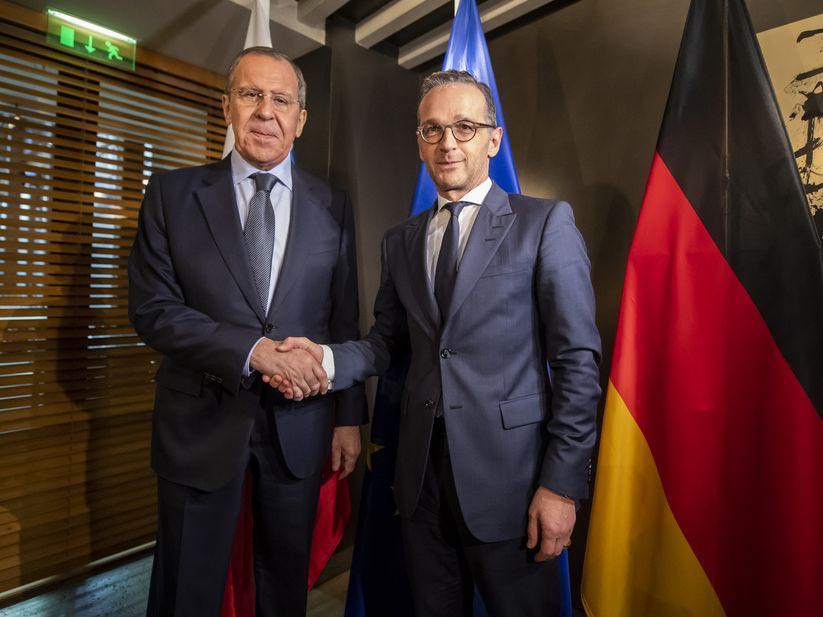 Germany's foreign minister Heiko Maas (right) with his Russian colleague Sergei Lavrov at the Munich Security Conference in 2019.
Germany's foreign minister Heiko Maas (right) with his Russian colleague Sergei Lavrov at the Munich Security Conference in 2019.
Photo MSC
The German government and the major part of parliament and the public share this concern. The concern, however, has not and in all probability will not in the foreseeable future translate into meaningful, coordinated action in conjunction with the United States. Three major issues account for this. First to be named is the government’s refusal, shared in parliament and by the public, to provide Ukraine with defensive weapons to deter the Kremlin from military aggression and if that were to fail to defend itself; second, the failure to terminate Nord Stream 2 as part of the realization that this project is far from being purely ‘commercial’ but has geopolitical implications, including the economic and political weakening of Ukraine as part of Moscow’s overall project to destabilize the country and deny to it a European path of development; and third, to alleviate some of the United States defense burden in Europe by a significant military modernization effort and meeting its obligation to spend at least 2 percent of GDP on defence.
The formulation and execution of a coordinated strategy with the United States would require major changes in the German government’s stance. It would have to communicate to the public that Russia has turned from being a ‘partner’, let alone a ‘strategic partner’, to a strategischer Gegner, that is, to a strategic adversary or opponent − to what Mitt Romney called the ‘number one geopolitical foe’ and Biden the ‘biggest threat’ to United States’ security, and acknowledge that it is the biggest threat also to European security. It is more than doubtful that the current government coalition parties during the electoral campaign or their successors after the autumn elections will provide such clarity.
This article, with all references to quotations, originally appeared in the Marshall Center’s Perspectives publication series, accessible at https://www.marshallcenter.org/en/publications/perspectives/can-and-will-germany-be-viable-partner-us-pushback-strategy-towards-russia-0.
